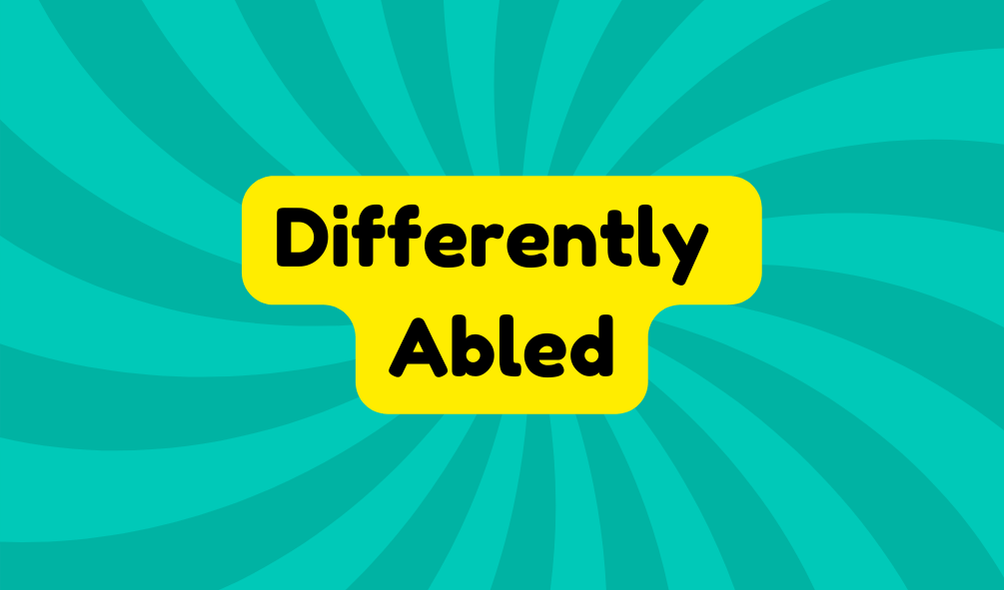The term "differently abled" attempts to reshape societal views on disabilities by focusing on empowerment. Originating in the 1980s, it aimed to eliminate stigma but can also be seen as euphemistic. While it encourages positive representation, it sometimes oversimplifies complex realities. Phrases like "overcoming challenges" often accompany this term, highlighting both strengths and struggles. Consequently, understanding its implications remains important. Exploring this topic reveals deeper insights into language, identity, and societal expectations surrounding abilities.
Synonyms
In the discussion of the phrase "differently abled," it is essential to reflect on its synonyms, which often indicate varying attitudes towards disability. These terms play a vital role in shaping public perception and must be chosen thoughtfully.
- Superbly unique individuals
- Uniquely empowered populations
- Individuals with diverse abilities
- Adaptive skills champions
- Inclusively capable citizens
Such language can foster empathy or evoke skepticism, highlighting the importance of inclusive language in societal dialogues. While some synonyms aim for positivity, the challenge remains to address disabilities honestly, balancing empowerment with realistic portrayals of people's experiences in adaptive skills development.
Example of Sentences
The phrase "differently abled" often sparks a variety of opinions, particularly when used in everyday conversation. Many hesitate to embrace this term, questioning its effectiveness in promoting inclusivity. Effective examples usage can clarify its intent, illustrating a shift towards more inclusive language. Consider the following sentences:
- "The differently abled athlete inspired everyone with his remarkable triumph."
- "Her approach to differently abled education emphasizes strengths, not limitations."
- "Incorporating differently abled voices enriches our community discussions."
- "They deserve opportunities like anyone else, regardless of abilities."
- "Understanding differently abled perspectives fosters empathy and innovation."
These sentences highlight the empowering potential of this language shift.
Origin
Evolving language is often reflective of changing societal attitudes, and the origin of the phrase "differently abled" serves as a prime example. Coined by the US Democratic National Committee in the early 1980s, it arose within a historical context that sought political correctness. This term was a deliberate attempt to reshape societal perceptions, moving away from the stigma attached to "disabled" and "handicapped." While well-intentioned, its adoption reflects a complex societal impact; some see it as empowering, while others critique it as a euphemistic oversimplification. Ultimately, the phrase illustrates the intricate relationship between language, identity, and societal expectations.
Collocations
Collocations surrounding the term "differently abled" reveal a blend of common phrases that both support and challenge the concept. Language usage in this area reflects evolving societal perceptions, yet contradictions remain evident. Some concerning collocations include:
- "Overcoming challenges"
- "Special needs"
- "Empowerment through ability"
- "Inclusion initiatives"
- "Confronting stereotypes"
These phrases evoke emotions while highlighting the complexity of how society discusses disabilities. They illustrate the ongoing struggle for positive representation versus lingering stigma. As language evolves, society must continue reevaluating how these terms impact perceptions and attitudes toward those labeled as differently abled, promoting innovation in inclusion and understanding.
How to Use in Everyday Language
Using the term "differently abled" in everyday language can be a thoughtful way to approach discussions around disability, but it requires careful consideration. While it aims to promote inclusive language, it can sometimes feel disingenuous if not used genuinely. Individuals should endeavor for authentic conversations that respect people's experiences. In everyday communication, context matters; using "differently abled" in formal situations may differ from casual chats. Balancing sensitivity with clarity remains essential. Those who adopt this term need to understand its implications and engage with individuals' preferences, ensuring that language empowers rather than alienates. True inclusivity starts with listening and respect.
Why Is It Still Relevant Today?
The phrase "differently abled" remains relevant today due to ongoing societal discussions about disability and inclusion. It serves as a reminder of the need for impact assessments regarding societal attitudes towards individuals with disabilities. As awareness grows, the term emphasizes the potential for empowerment rather than limitation.
| Positive Aspects | Neutral Language | Impact on Society |
|---|---|---|
| Fosters inclusion | Avoids negative terms | Informs policy change |
| Enhances self-esteem | Promotes acceptance | Guides education efforts |
| Encourages dialogue | Reduces stigma | Shapes future attitudes |
This evolution reflects a vital step towards understanding.







